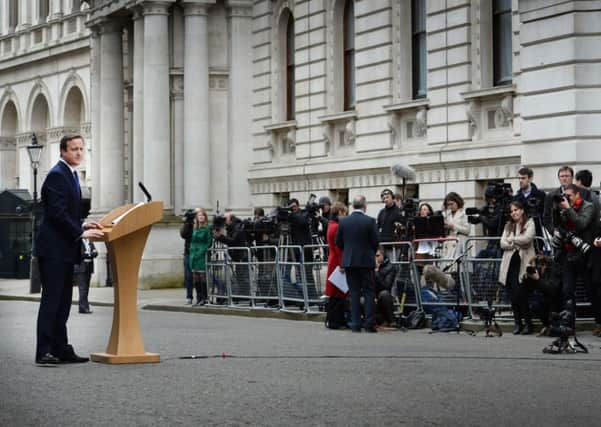Andrew Vine: Why I respect MPs more than cynics like Russell Brand and Brian May


Such is the slur against politicians that is set to underpin the election campaign, and it is all the more disturbing for having moved from half-cut pub conversations into the mainstream.
This is a narrative propelled by money, public profile and even glamour of sorts, all of which make it dangerously seductive and lend an air of authority.
Advertisement
Hide AdAdvertisement
Hide AdThe fact that this characterisation of the political class is grossly unfair is not likely to be enough to counter it in the minds of many people, and now that Parliament has been dissolved and the campaigning intensifies, the slur threatens to have a real effect on turnout and the nature of the Government we end up with.
Running parallel with a generalisation about the characters of politicians is another damaging falsehood that has gained a worrying amount of traction – that our system is somehow broken, and needs to be torn apart.
Now David Cameron has travelled to Buckingham Palace for an audience with the Queen to confirm the formalities for the May 7 election, it’s fair to assume we’ll be hearing these twin themes parroted ever more loudly in the coming weeks, because it has already started, with the aid of some eyecatching celebrities.
Quite why any voter should be swayed by the opinion of a performer they admire has always escaped me, but the fact is that in our celebrity-obsessed society the famous have a disproportionate degree of influence.
Advertisement
Hide AdAdvertisement
Hide AdSo when the guitarist Brian May, hugely popular because of his group Queen, launched a political campaign with some of his estimated fortune of £90m, a lot of people listened.
He called it Common Decency, and the first part of what he said made perfect sense. Get out and use your vote, he urged. Rock on, Brian.
The second part, though, was rather less inspiring. Vote not for a party, but for individuals. He said: “The whole system needs to be torn apart and rebuilt. It is the time for people to reclaim democracy.”
Oh dear, Brian. You’ve hit a bum note there.
Not long before, another much-admired celebrity, that fine actor Michael Sheen – who has, coincidentally, made something of a speciality out of portraying Tony Blair – told a rally in his native Wales that politicians should believe in something, the implication being that they don’t.
Advertisement
Hide AdAdvertisement
Hide AdThese interventions clearly belong to the school of condemning politicians and the system within which they operate as rotten, plain wrong on both counts.
But these voices grow ever louder, however nonsensical they are. Only last week a magazine specialising in politics and economics named – without the merest hint of irony – the comedian Russell Brand as the fourth most influential thinker in the world, thanks to a turgid book he had published calling for the downfall of capitalism.
This is beyond parody, but only goes to show Brand’s loudly-trumpeted view that people should not bother voting in the election as a protest against absolutely everything, is being heard.
Of course, the politicians themselves bear a substantial measure of blame for these destructive views gaining support.
Advertisement
Hide AdAdvertisement
Hide AdThe MPs’ expenses scandal of 2009, which caught out the greedy and in some cases the criminal, played right into the hands of the anti-politics brigade.
The scandal continues to cast a long shadow, and public disgruntlement with the political class in general has only been aggravated by the perception that too many of our MPs have never lived in the everyday world of work and making ends meet.
Moving directly from politics, philosophy and economics degrees into full-time political jobs and thence to a seat in the Commons does not endear senior politicians to those who deal with the ups and downs of day-to-day jobs.
The relentless culture of spin that entered politics with New Labour in 1997 is another factor. It was a dark art used for short-term advantage, but has become so ingrained as to make the electorate suspicious that much of what they hear is not simple truth, but carefully manipulated for partisan gain.
Advertisement
Hide AdAdvertisement
Hide AdNevertheless, the slurs against politicians and the system are wrong. The system is open and honest, rightly brutal in the ruthlessness with which voters can kick out those who fail to deliver.
And despite the occasional bad apple, the politicians are honest as well. I’ve known dozens of them over the course of 30 years from all three main parties.
Every single one of them was honest, decent and concerned above all else with the welfare of their country and their constituents. Egotistical? Sometimes. Self-serving? No.
They have a harder job than ever during this election – not only persuading voters that they offer the right answers, but also persuading them to ignore a portrayal of politics, and those who practice it, that is a travesty.